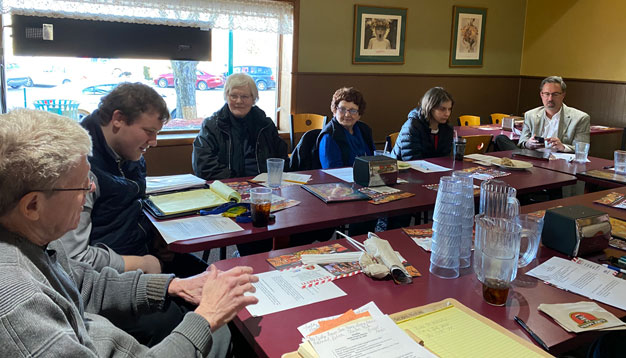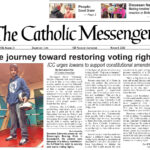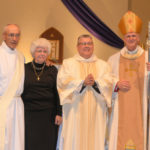
Democrats and Republicans participate in a Braver Angels event in Clinton in February. Franciscan Peace Center in Clinton hosts Braver Angels events to help people of different political ideologies learn to dialogue respectfully and constructively.
Psychologist, peace expert discuss self-care and finding common ground in tense times
By Lindsay Steele
The Catholic Messenger
RELATED: Find more resources in this week’s Catholic Messenger Editorial
In the days leading up to what has commonly been dubbed “the most important election of our lifetime,” Chris McCormick Pries could see the tension building. “People are so tightly wound right now” with the stresses of the COVID-19 pandemic, “and all this happens during an election year… It just adds to the uncertainty and fear we have.”
People invested a tremendous amount of emotion and concern and passion into their thoughts and their reactions during the election season, observed McCormick Pries, a member of St. John Vianney Parish in Bettendorf who recently retired from her position as clinical director of Vera French in Davenport. Many people feared “doom and gloom and the end of life as we know it” if the opposing candidate were to win the election.
While Election Day has come and gone, feelings of fear, anxiety, anger, despair and depression are expected to continue, McCormick Pries said. While these feelings are natural when a preferred candidate does not win, they can also be experienced by the winning side, which may fear violence and conflict from the opposition. “You can control how you vote, but you can’t control the outcome,” and when it’s something that is going to impact your life significantly, that loss of control can feel unbearable.
Practicing peaceful politics post-election
Regardless of election results, individuals can continue to participate in politics and make sure their voices are heard, said Lori Freudenberg, community outreach director of Franciscan Peace Center in Clinton. This participation can help people avoid feelings of despair and helplessness post-election. “We know things aren’t always going to go our way, but we can continue to have an active role in our democracy and our future. We can’t just sit back and complain.”
McCormick Pries said Jesus serves as a great example of how people should fight for change. “Obviously, Christ engaged in conflict, but he stayed focused as he challenged the rules of the day.” He questioned policies and ideologies but avoided personal attacks. “We can speak the truth but at the same time be welcoming and engaging with people, even those who have a different opinion.”
Freudenberg said participating in peaceful demonstrations and contacting elected officials on specific issues are productive and effective ways for people to “make their concerns known” between elections. Change “may not happen overnight, but we can continue to work together and create the change we want to see.” Foster connection, not division
In the buildup to the 2020 election, Franciscan Peace Center hosted a series of “Braver Angels” events intended to help people with opposing viewpoints learn to dialogue in a respectful manner. Through these events, Freudenberg has observed that most people have the same basic priorities: “wanting what’s best for their families and the future of their children.” What people disagree on is “how to get there.”
Especially during a time when “emotions are very much on the surface with people anxious and feeling worries about the future,” it is important for family members, friends and neighbors with opposing views to focus on what they have in common and what brought them together in the first place, Freudenberg said.
When participating in political conversations with family members, friends and neighbors who vote differently, “be respectful, listen, try to ask questions for understanding,” Freudenberg said. It is unlikely that someone can completely change another person’s political mindset, but the two may come to agreement on specific issues.
Both women said it is okay to set boundaries if emotions are too strong and constructive dialogue is not possible. “Make peace with the fact that we will not always agree, and recognize that we need to behave in ways that reflect our faith and reflect our love for each other,” McCormick Pries said. “It’s important to be merciful and forgiving.”
Enhancing mental health
Good mental health strategies can help people “meet the moment in a healthier way,” whether it’s the election, coronavirus, bad weather, grief, loss, a financial downturn, etc.,” McCormick Pries said. “Good health starts with acknowledging and recognizing what you have control over and what you don’t have control over.”
McCormick Pries suggests focusing on five themes for better mental health:
• Connecting with people, nature or God.
• Moving, i.e., getting up and exercising, appreciating nature and being involved with the world outside you.
• Breathing. “Every mental health intervention begins with deep breathing.” Breathing exercises “help us focus our thoughts and calm our bodies.”
• Reflecting. For Catholics, have an awareness of how you are practicing your faith and how you are loving God and loving people in your daily actions.
• Giving. “If I’m giving of myself and being grateful for what I have, rather than reflecting on what I don’t have,” it will help formulate a more positive mindset.
Prayer
One major way to practice self-care is to turn to God in prayer, McCormick Pries said. “We need to be prayerful during this time and ask God what we need to do in order to get through this.”
Having a prayer ritual at night can be very calming. “It’s about letting go and being able to recognize that through prayer we find peace and we find our spiritual connection with God. That will allow us to unwind and sleep a little better.”
She encourages people to avoid watching the news or browsing social media before bed. “It’s important to be able to separate from this world and have a spiritual routine that allows us to let go at night.”











